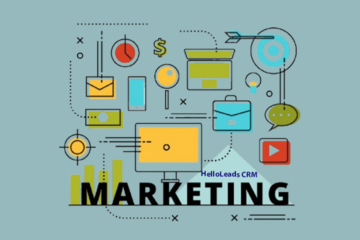
In the ever-evolving world of business, sales and Customer Relationship Management (CRM) are at the forefront of innovation. What was once a game of cold calls and spreadsheets has now transformed into a dynamic, data-driven, and customer-centric process. As we venture into the future, let’s delve into some intriguing forecasts and trends that are moulding the future of sales and CRM.
1. AI and Automation:

Imagine a sales assistant that never sleeps, never gets tired, and never misses a beat. AI-powered sales automation is revolutionizing the way we do business. From chatbots that handle customer inquiries 24/7 to predictive analytics that help sales reps identify the hottest leads, AI is a game-changer.
AI-driven CRM systems will soon be able to predict customer needs, automate follow-ups, and even assist in drafting personalized emails. This level of automation not only saves time but also ensures that no lead or customer gets left behind. As the saying goes, “Time is money,” and AI is here to help you save both.
2. Data-Driven Decision-Making:
Sales and CRM have perpetually revolved around relationships, but in the future, these connections will be bolstered by data. Big data and analytics are the superpowers that sales and CRM professionals will wield. This data can inform you about your most lucrative customers, their optimal buying times, and their preferred communication channels.
With this treasure trove of information, sales teams can tailor their strategies to individual customers, increasing conversion rates and customer satisfaction. Informed decisions will be the bedrock of successful sales and CRM strategies.
3. Omni-Channel Customer Engagement:
Your customers are everywhere – on social media, email, chat, phone, and in person. To be successful, your sales and CRM strategies must be present wherever your customers are. The future will see a seamless integration of these channels.
Imagine a customer receiving an email offer, clicking a link, chatting with a sales rep, and finally making a purchase – all within the same conversation thread. This omni-channel approach ensures that customers receive consistent, personalized experiences across all touchpoints. It’s not just about being where your customers are; it’s about being there when they need you.
4. Personalization Beyond the Name:
Personalization isn’t just about addressing your customers by their first name. In the future, it will go way beyond that. Sales and CRM will harness AI and data analytics to understand individual preferences, pain points, and buying behaviors. It’s akin to having an intuitive salesperson who comprehends your preferences precisely.
Tailoring product recommendations, content, and offers to each customer’s unique profile will be the norm. This not only elevates the customer experience but also significantly boosts conversion rates. The future revolves around ensuring your customers feel like royalty.
5. Social Selling and Influencer Marketing:

Social media is where it’s at, and the future of sales and CRM knows it. Salespeople are no longer limited to the boardroom or the phone; they’re online, building relationships, and influencing purchasing decisions.
Social selling is about engaging with customers on platforms like LinkedIn, Twitter, and Instagram, establishing trust, and then gently guiding them towards a purchase. Influencer marketing, too, plays a significant role. Brands partner with influencers to connect with their niche audiences. The power of recommendation from a trusted source can’t be underestimated.
6. Transparency and Trust:
In a world where data is gold, customers are becoming increasingly concerned about their privacy. They want to know what data you collect and how you use it. The future of sales and CRM will hinge on transparency and trust.
This means not only adhering to data privacy regulations but also being open and honest with your customers. Trust is hard to earn but easy to lose. With the right CRM tools and a customer-centric approach, businesses can build trust and foster long-lasting relationships.
7. Remote Work and Collaboration:
The COVID-19 pandemic accelerated the adoption of remote work, and it’s here to stay. Sales teams are no longer confined to office cubicles. Remote work will shape the future of sales and CRM.
Tools like video conferencing, project management software, and CRM systems will continue to be crucial in keeping teams connected and productive. The sales process will become more collaborative as team members work together seamlessly, regardless of their physical locations.
8. Sustainability and Social Responsibility:
The future of sales and CRM isn’t just about the bottom line; it’s also about making a positive impact on society and the environment. Customers are increasingly looking for companies that are socially responsible and environmentally conscious.
Sales and CRM will need to align with these values. Companies that demonstrate a commitment to sustainability and social responsibility will have an edge in attracting and retaining customers. It’s no longer just about what you sell but also how you sell it.
In conclusion, the future of sales and CRM is an exciting frontier of innovation and customer-centricity. AI and automation are taking over the repetitive tasks, allowing sales teams to focus on what they do best – building relationships. Data-driven decision-making, omni-channel engagement, and personalization are driving conversions. Social selling and influencer marketing are changing the game, while transparency and trust are becoming non-negotiable.
As we embrace remote work and collaboration, sustainability and social responsibility will become critical components of successful sales and CRM strategies. The future is bright, and those who adapt to these trends will find themselves at the forefront of sales and CRM excellence. So, gear up, because the future is knocking, and it’s full of possibilities!
Share this blog :











